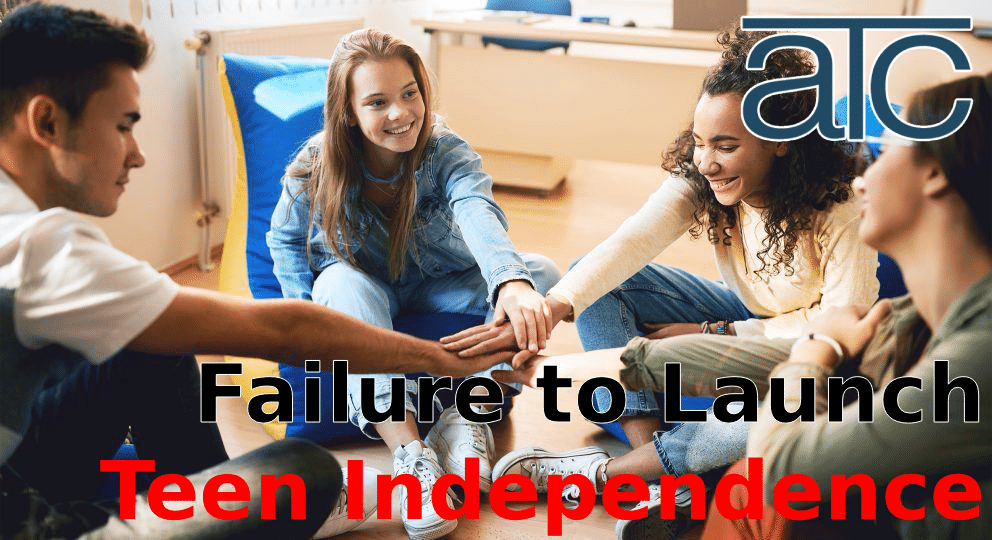Transitioning To Adulthood: How Failure To Launch Programs Foster Independence
Growing up is hard. Many young adults struggle to become independent. They face big changes and new responsibilities. That can feel stuck and lost. Failure to Launch programs foster independence, teach young adults skills for adult life, teach living independently, getting a job and managing finances.
Many have succeeded through these programs. One said “I feel ready to take on the world”. These programs provide real help and hope.
They help young adults towards a better future. Read on.
Takeaways
- Failure to Launch programs are for young adults 18-30 who struggle with independence, covering money, social skills and mental health.
- They teach life skills like cooking and budgeting, career counseling, therapy (CBT and DBT) and social skills through hands on practice.
- Success rates are high: 75% find a job within 6 months, 90% move out within a year and 80% show fewer depression symptoms after completing the program.
- FTL programs include families, teaching parents to support not enable and improve communication between family members.
- When choosing a program look for certification, individual plans and a good fit for the young adult.

Understanding the Transition to Adulthood and Its Challenges
Growing up is hard. The jump from teen to adult brings new challenges. Young people have to pay bills, get jobs and live on their own. But many struggle with these things. They have money problems, mental health issues and lack of basic life skills.
These problems can lead to what we call “failure to launch”.
Today’s world makes this transition even harder. High rent, tough job markets and social media adds extra stress. Many young adults feel lost and unsure. They need help to build confidence and learn the skills.
That’s where special programs come in. These programs teach young people how to deal with life’s demands. They offer support for mental health and job hunting. With the right help young adults can become strong independent people.
What are Failure to Launch Programs?
Failure to Launch programs are for young adults who struggle to become independent. These programs support people 18-30 who are having trouble with money, social skills or mental health as they try to stand on their own two feet.
FTL Program Components for Independence
Failure to Launch (FTL) programs help young adults become independent. These programs have key components that build life skills.
- Life Skills Training: FTL programs teach daily living skills. Cooking, cleaning, budgeting and time management.
- Career Counseling: Job search help and resume writing. Interview practice and vocational training.
- Therapeutic Support: Individual and group therapy sessions. CBT and DBT.
- Social Skills Development: Programs build healthy relationships. Communication, conflict resolution and teamwork.
- Self-Care and Routine Building: FTL programs emphasize physical health. Exercise habits, nutrition and sleep hygiene.
- Goal Setting: Participants learn to set and achieve goals. Self confidence and motivation.
- Emotional Regulation: Programs teach coping strategies for stress and anxiety. Mindfulness is often part of this training.
- Problem Solving Skills: Young adults learn to problem solve independently. Decision making and critical thinking.
- Financial Literacy: Programs cover budgeting, saving and understanding credit. So young adults can manage their money.
- Technology Skills: FTL programs often include computer literacy training. This may cover online job searching and professional email etiquette.
Life Skills Training
Life skills training is a big part of failure to launch programs. It teaches young adults how to live on their own. These programs cover the basics like cooking, cleaning and managing money.
Students learn to make budgets, pay bills and shop for groceries. They practice doing laundry and keeping a clean home.
Beyond household tasks life skills training builds confidence. It helps young adults set goals and problem solve. They learn to manage time, make decisions and handle stress. These skills are essential for success in work and relationships.
With practice students get the tools to thrive as independent adults.
Career Counseling and Vocational Training
Career counseling and job training are big parts of Failure to Launch programs. These services help young adults find their way in life. They learn to write resumes, practice interviews and explore different careers.
Counselors work one on one with clients to identify their strengths and interests. They also teach job search skills and how to network.
I’ve seen these programs work firsthand. One client, Jake, came in feeling lost and unsure of his future. Through career testing and talking with his counselor he found his passion for graphic design.
The program helped him build a portfolio and get an internship. Now Jake works full time in a job he loves. These programs give young adults the tools and confidence to succeed in the working world.
Therapeutic Support (CBT, DBT, etc.)
Failure to Launch programs offer mental health support. They use evidence based methods like Cognitive Behavioral Therapy (CBT) and Dialectical Behavior Therapy (DBT). These therapies help young adults manage emotions and change negative thinking.
CBT teaches skills to identify and change negative thinking patterns. DBT teaches to accept difficult feelings while learning better coping skills.
I’ve seen these therapies work firsthand. One client came in feeling hopeless and stuck. Through CBT she learned to challenge her self doubt. She started setting small goals and celebrating wins.
DBT helped her not use drugs to cope with stress. After 6 months she got a job and moved into her own place. These programs give young adults the tools to live on their own.
Social Skills Development
Social skills are essential for success. Failure to Launch programs help young adults develop these skills. They teach how to start and keep conversations going. They also teach how to read body language and facial expressions.
These programs use role playing to practice real life scenarios. This hands on approach builds confidence.
I’ve seen these programs work magic. One shy teen I knew came out of his shell after learning to make eye contact and small talk. Group activities in the program helped him feel more comfortable with peers.
He even started a club at his college! Social skills training truly opens doors for young adults entering the world.
Self Care and Routine Building
Self care and routine building are part of growing up. Failure to Launch programs teach young adults how to take care of themselves daily. They learn to make healthy meals, clean their living space and stick to a sleep schedule.
These habits build confidence and independence.
Having a daily routine also helps manage stress and mental health. Young adults learn to schedule time for exercise, hobbies and relaxation. They practice things like deep breathing or journaling to cope with difficult feelings.
Over time these self care habits become automatic. This helps young adults feel more in control of their life as they enter adulthood.
How FTL Programs Support Families and Young Adults Together
FTL programs bring families and young adults together in a unique way. They teach parents how to support their kids without doing everything for them. This helps young adults grow more independent.
Family counseling is a big part of these programs. It helps everyone learn new ways to talk and act with each other. Parents learn to set healthy limits while still showing love. Young adults learn to take on more tasks for themselves.
These programs also give families tools to handle tough times. They teach how to deal with mental health issues and substance use problems. Parents learn how to encourage their kids without enabling bad habits.
Young adults get help with life skills like cooking and money management. This teamwork between families and young adults creates a strong base for growth. It helps everyone move forward in a positive way.
Success Stories and Measurable Outcomes in FTL Programs
Success stories from Failure to Launch (FTL) programs show real change in young adults’ lives. These programs help people grow and become more independent, with clear results we can measure.
- Job Success: Many FTL graduates find and keep jobs. One program reported that 75% of its participants got jobs within six months of finishing.
- Better Mental Health: Young adults often feel less anxious and sad after FTL programs. A study found that 80% of participants had fewer symptoms of depression after completing the program.
- Living on Their Own: FTL programs teach skills for independent living. In one case, 90% of graduates moved out of their parents’ homes within a year.
- Money Management: Participants learn to handle money better. A survey showed that 70% of FTL graduates could stick to a budget six months after the program.
- Improved Relationships: Many young adults report better connections with family and friends. One program found that 85% of participants felt more confident in social situations.
- Less Drug Use: FTL programs often help reduce substance abuse. A study reported a 60% drop in drug use among participants after completing the program.
- Educational Progress: Many young adults go back to school or finish degrees. One FTL program saw 65% of its participants enroll in college or vocational training.
- Better Self-Care: Graduates often develop healthier habits. A follow-up study found that 75% of participants were exercising regularly and eating better.
- Increased Self-Esteem: Young adults often feel more confident after FTL programs. One program reported an average 40% increase in self-esteem scores.
- Long-Term Success: Studies show lasting benefits. A five-year follow-up found that 70% of FTL graduates were still living independently and employed.
Choosing the Right FTL Program
Picking the best Failure to Launch (FTL) program is key for young adults. Families should look at a few things. First, check if the program is certified. This shows it meets high standards.
Next, look at how they help people. Some use talk therapy, while others focus on job skills. It’s smart to find one that fits your child’s needs. Also, see how much they involve families.
Good programs work with parents too.
Every young adult is different. Some struggle with money skills, while others need help with social stuff. A good FTL program will make a plan just for your child. They’ll work on what your kid needs most.
This personal touch can make a big difference. It helps young adults feel more ready to live on their own. When you find the right fit, you’ll see your child grow in confidence and skills.

The Next Steps
Failure to Launch programs provide essential support for young adults facing challenges with independence. These programs impart crucial skills, enhance self-assurance, and offer necessary assistance.
They help establish a solid base for future success. Families can discover support and direction through these programs. If you notice signs of difficulty in a loved one, act promptly.
Contact ATC today to begin the path to a more promising future.
Frequently Asked Questions
-
What are Failure to Launch programs?Failure to Launch programs help young adults transition to adulthood. They're like a bridge, guiding teens and twenty-somethings to become independent. These programs offer therapy, coaching, and mentoring to boost resilience and personal growth.
-
Who can benefit from these programs?Anyone struggling to "adult" can gain from them. This includes folks with mental health conditions, learning differences, or high-functioning autism. Even those battling loneliness, low self-esteem, or substance misuse find support here.
-
How do these programs tackle mental health issues?They use various approaches. Individual therapy, family sessions, and peer support are common. Some use specific methods like dialectical behavioral therapy or acceptance commitment therapy. The goal? To address anxieties, fears, and other mental health hurdles.
-
What role do parents play in these programs?Parents are key players. Programs often teach parenting skills to reduce family tension. They learn how to support their child's independence without enabling harmful behaviors. It's a delicate balance, but crucial for success.
-
Do these programs help with practical life skills?Absolutely! They're not just about feelings. These programs teach interpersonal skills, goal-setting, and how to adult 101. From managing money to job hunting, they cover the bases for real-world success.
-
How long do these programs typically last?It varies. Some are short-term, lasting a few months. Others can go on for a year or more. The length depends on individual needs and progress. Remember, growing up isn't a race - it's a journey.

Recent Comments